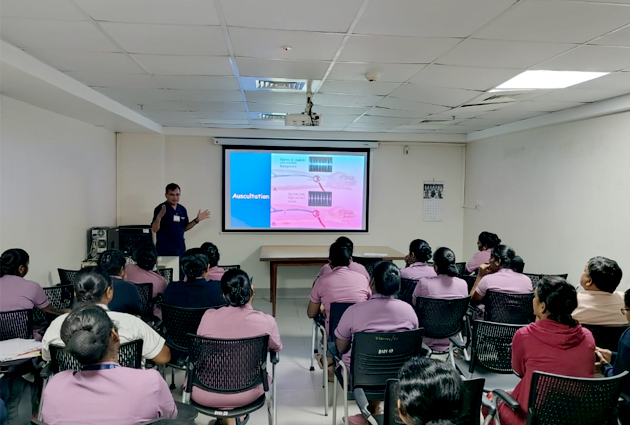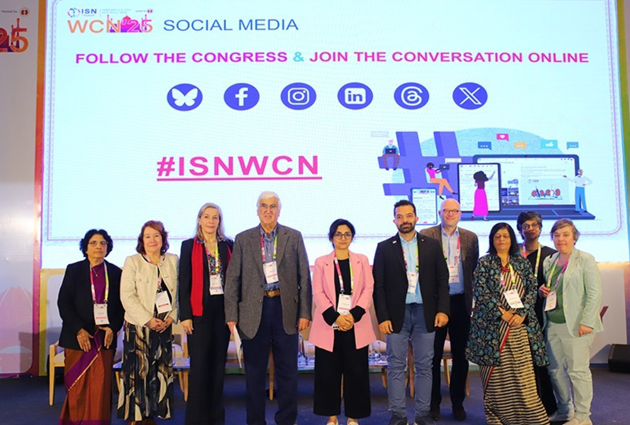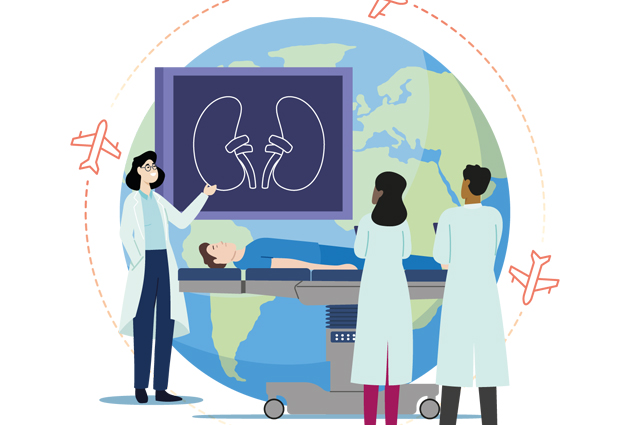ISN Fellows’ Experiences from Around the World
In 2019, ISN welcomed 40 Fellows from around the world. ISN congratulates all graduated fellows and presents here a sample of experiences to highlight the capacity building and impact to kidney care made possible through the ISN Fellowship Program.
 Xu Chen, from the Affiliated Hospital of Nantong University, Nantong, China, trained for 12 months in Glomerular Disease, AKI, and CKD under mentorship from Jonathan Barratt at the John Walls Renal Unit in Leicester General Hospital in the UK with support from the ISN Fellowship Program and Kidney Research UK.
Xu Chen, from the Affiliated Hospital of Nantong University, Nantong, China, trained for 12 months in Glomerular Disease, AKI, and CKD under mentorship from Jonathan Barratt at the John Walls Renal Unit in Leicester General Hospital in the UK with support from the ISN Fellowship Program and Kidney Research UK.
Xu Chen developed basic science and clinical research skills in the study of glomerular disease. She developed an in-depth knowledge of laboratory and clinical research in IgA nephropathy. In particular, she focused on comparing Caucasian and Chinese IgAN populations concerning biomarkers of disease.
According to Xu Chen, both the incidence and prevalence of kidney disease in her home region are on the increase, but effective therapeutic strategies for CKD are limited. Patients rely on dialysis and renal transplantation, which cannot prevent all the complications of CKD. An improved understanding of the nature of CKD progression is needed, as well as effective therapeutic methods.
Xu Chen received training in a range of laboratory and analytical methods in anticipation of leading a laboratory-based research program on her return to China. Xu comments: “I believe Nantong will benefit greatly by the increased exposure to research and clinical training offered by Leicester.”
The Affiliated Hospital of Nantong University collaborates on several initiatives with Leicester General Hospital through the ISN SRC Program.
 Judith Aujo from the Mulago National Referral Hospital in Kampala, Uganda, spent two years training at the Red Cross War Memorial Children’s Hospital in Cape Town, South Africa, under mentorship from Professor Mignon McCulloch and Dr. Peter Nourse, supported by ISN and the Salmasi Family.
Judith Aujo from the Mulago National Referral Hospital in Kampala, Uganda, spent two years training at the Red Cross War Memorial Children’s Hospital in Cape Town, South Africa, under mentorship from Professor Mignon McCulloch and Dr. Peter Nourse, supported by ISN and the Salmasi Family.
Judith’s training focused on general pediatric nephrology, dialysis, and transplant. Her training highlighted the need to produce data to lobby governments for improved pediatric renal services and patient care.
According to Judith, kidney care in Uganda is generally poor. The prevalence of CKD is over 20%. There are around 11 nephrologists in Uganda for an estimated population of 39 million and no trained pediatric renal nurses. Most of the doctors and services are in the capital city; so, Judith’s home institution in Mulago receives referrals from across the country even though they have no designated area for pediatric dialysis, but access the service from the adult dialysis unit.
Judith plans to train others in her home institution, commenting: “It was a great opportunity for me to have this training. I have learned a lot, appreciated the many gaps in our healthcare systems back home, but also realize that things can be improved. I look forward to having other colleagues get this training opportunity so as to build bigger teams.”
Judith is currently at the forefront of running the pediatric renal services in Mulago and is working to establish a functional (acute) PD program. She will be involved in transplant activities when Mulago Hospital starts this service.
Professor McCullogh adds: “This is such an excellent program for training fellows in Africa. Judith benefitted from two years and really secured her knowledge and became confident.”
The Mulago National Referral Hospital has an SRC link with the Baylor College of Medicine in the Texas Children’s Hospital in the US.
 Maisarah Jalalonmuhali, from the University of Malaya in Kula Lumpur, Malaysia, trained under mentorship from Patrick Coates in kidney transplantation at the Royal Adelaide Hospital in Adelaide, Australia, with support from the ISN and CREED.
Maisarah Jalalonmuhali, from the University of Malaya in Kula Lumpur, Malaysia, trained under mentorship from Patrick Coates in kidney transplantation at the Royal Adelaide Hospital in Adelaide, Australia, with support from the ISN and CREED.
Maisarah was involved in several clinical research projects as part of her training objectives. Her paper: Serum Free Light Chain as Surrogate Marker For Renal Activity In Lupus Nephritis won third place in the Fellowship Program Awards at WCN 2019.
Maisarah was able to conduct hands-on laboratory immunology tests and became confident in managing pre and post-transplant care, immunology interpretation, and long-term complications following transplantation.
According to Maisarah Jalalonmuhali, there is good dialysis support in Malaysia, but kidney transplantation knowledge needs developing. She says her training will help improve transplant care and believes the number of transplants in Malaysia will increase. She comments: “It was a great fellowship program with many opportunities and exposure regarding kidney transplants.”
 Nirajan Mainali, from the Nobel Medical College Teaching Hospital in Biratnagar, Nepal, trained in renal and transplantation pathology under mentorship from Dr. Kim Solez from the University of Alberta in Edmonton, Canada.
Nirajan Mainali, from the Nobel Medical College Teaching Hospital in Biratnagar, Nepal, trained in renal and transplantation pathology under mentorship from Dr. Kim Solez from the University of Alberta in Edmonton, Canada.
Nirajan gained extensive experience in native kidney and transplant kidney pathology as well as in composing kidney biopsy reports. According to Dr. Solez, Nirajan “became an excellent renal pathologist” during his time at the University.
Nirajan submitted two case studies from his training as abstracts for WCN20 that were accepted for presentation as posters.
According to Nirajan, renal pathology services in Nepal are limited. He aims to establish a renal lab there and believes his training will help make a noticeable difference in the region. He comments: “It was a great program.”
 Francisco Vargas, from Hospital Doctor Arnulfo Arias Madrid in Panama City, Panama, trained in clinical nephrology and renal transplantation and dialysis under mentorship from Dr. Manuel Praga at the Hospital Universitario 12 de Octubre, in Madrid, Spain, with support from the ISN and SLANH.
Francisco Vargas, from Hospital Doctor Arnulfo Arias Madrid in Panama City, Panama, trained in clinical nephrology and renal transplantation and dialysis under mentorship from Dr. Manuel Praga at the Hospital Universitario 12 de Octubre, in Madrid, Spain, with support from the ISN and SLANH.
As part of his training, Francisco spent two months in transplant consultation following up on post-operative kidney transplant patients and assisting in the treatment of patients with other organ transplants referred to the nephrology department. Francisco was impressed by the collaboration between the nephropathology group and nephrologists as well as with other surgical teams to obtain the best results for patients. He comments: “From the moment I arrived in Madrid, the treatment offered by Dr. Prague and his team of nephrologists and residents was excellent. I was quickly integrated into daily work and teaching. I will be eternally grateful to the Nephrology service of the 12 de Octubre Hospital.”
According to Francisco, there is an epidemic of patients with CKD in Panama and an increasing number of patients who have difficulty accessing the dialysis they need. Panama City requires three or four additional hemodialysis rooms, and the number of transplants has fallen dramatically over the past five years.
Francisco plans to advocate for the development of nephropathology services in Panama and the need to update treatment and care protocols in clinical nephrology and renal transplantation. He wants to encourage new professionals to specialize in nephrology and is currently teaching Nurses and Postgraduates in his home institution.











